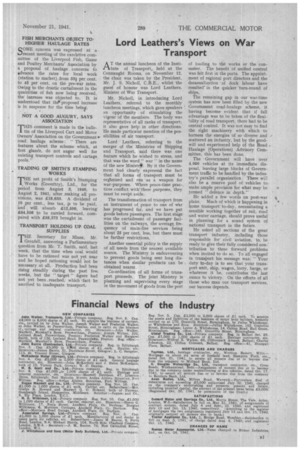Lord Leathers's Views on War Transport
Page 19

If you've noticed an error in this article please click here to report it so we can fix it.
AT the annual luncheon of the Institutetute of Transport, held at the Connaught Rooms, on November 12, the chair was taken by the President, Mr. J. S. Nicholl, C.B.E„ whilst the guest of honour was Lord Leathers, Minister of War Transport.
Mr. Nicholl, in introducing Lord
Leathers, referred to the monthly luncheon meetings, which gave speakers an opportunity of stimulating the vigour of the members. The body was representative of all ranks of transport; it also gave help in other directions. He made particular mention of the possibilities of air transport.
Lord Leathers, referring to the merger of the Ministries of Shipping and Transport, said there was one feature which he wished to stress, and that was the word " war " in the name of the new Ministr.. By it the Government had clearly expressed the fact that all forms of transport must be orgl.nized and run as a weapon for war-purposes. Where peace-time practices conflict with`these ,purposes, they must be swept aside.
The transformation of transport from an instrument of peace to one of w'ar has progressed far, and we have Rut goods before passengers. The first stage was the curtailment of passenger facilities on the railways, the average_ frequency of main-line services being about 25 per cent, less, but there must be further restrictions.
Another essential policy is the supply of all needs from the nearest available source. The Ministry is endeavouring to prevent goods being sent long distances when similar products can be obtained nearer.
Co-ordination of all forms of transport proceeds. The joint Ministry is planning and supervising every stage in the movement of goods from the port of loading to the works or the consumer. The benefit of unified control was felt first in the ports. The appointment of regional port directors and the deca,sualization of dock labour have resulted' in the quicker 'turn-round of ships.
The remaining gap in our war-time system has now been filled by the new Government road-haulage scheme, it having become. evident that if full advantage was to be taken of the flexibility of road transport, there had to be central control. It was not easy to find
the right machinery with which to harness the energies of so diverse and scattered an industry, but by the good will and experienced help of the Road Haulage (Operations) Advisory Committee, this has been done.
The . Government will have over 4,000 vehicles at its immediate dis
posal, leaving large blocks of Government traffic to be handled by the industry's parallel organization. There wiii also be a reserve pool of vehicles to. make ample provision for what may be termed "defence in depth."
He added a few words on post-war plans. Much of which is happening in home transport' to-day, necessitating a sensible working together of rail, road and water carriage, should prove useful in planning for a sound system of national transport in the future. He asked all sections of the great transport industry, including those responsible for civil aviation, to. be ready to give their fully considered con.: tribution to these forward problems when invited to do so. To all engaged in transport his message was: "Your duty to-day is to see that your transport unit, ship, wagon, lorry, barge, or whatever it be, contributes the last ounce to victory. On the efforts of all those who man our transport services, our success depends.




















































